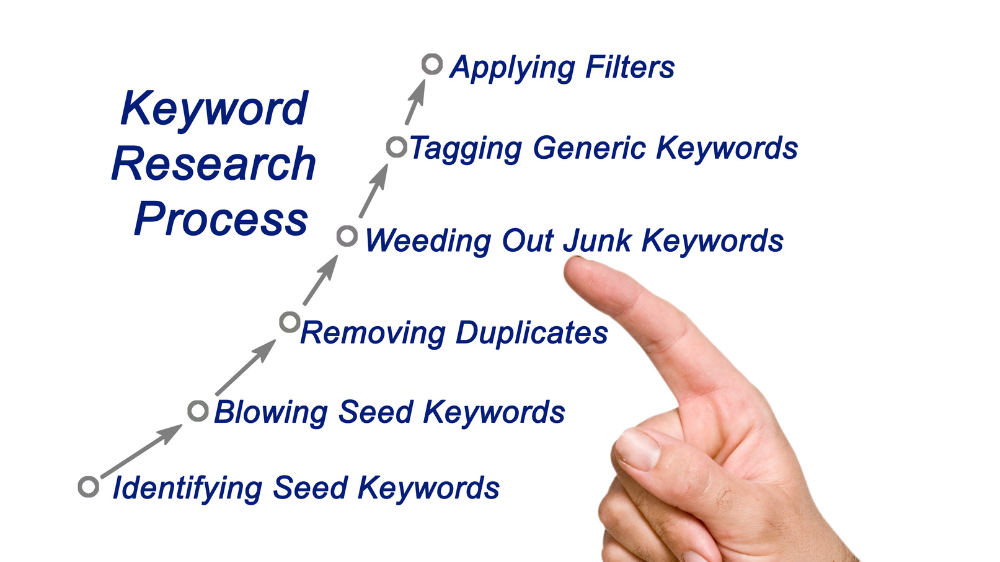- By Aneesah Coates
Utilizing the potential of SEO content keywords is essential for a strong online presence. Both short and long-tail keywords are effective strategies for healthcare content marketing, allowing your brand to improve its visibility on search engines. Balancing these content keywords in different areas of a blog post such as in titles, meta descriptions, and body text is essential, resulting in enhanced audience engagement. Using advanced techniques like keyword research tools and competitor analysis ensures that your content is relevant to your target audience.
Understanding the usage of SEO content keywords is crucial in optimizing your content for better search engine visibility. Essentially, content keywords are specific words and phrases that users search for when seeking a particular topic or answer. These words and phrases can be short-tail keywords (e.g., “nursing career”) or long-tail keywords (e.g., “high-paying nursing jobs”). A combination of these types of keywords would be an example of a winning healthcare content marketing strategy.
When you incorporate content keywords strategically into your writing, it helps search engines like Google recognize website relevance and makes it easier for users to find you. To make the most out of keywords, you should research what your target audience is looking for, how your competition utilizes these keywords, and stay aware of industry trends. It’s not good enough to just randomly use content keywords; you need to find the correct balance to capture readers’ attention and avoid over-optimization. You can use synonyms and variations associated with keywords to make content appear more natural and interesting.
The Basics of SEO Keyword Usage
Incorporating content keywords into your search engine optimization (SEO) strategy can significantly boost your website’s visibility and enhance user experience. An effective keyword strategy requires research into competitors’ approaches, thorough keyword research, and the appropriate balance between short-tail and long-tail keywords. You should use content keywords throughout your articles, from titles, meta descriptions, and headings to the body of the text itself. They should appear in a natural manner that supports your message and complements the blog post length.
Link building is an integral part of SEO, and content keywords can help here as well. By utilizing relevant keywords as anchor texts, you can create links to other web pages, leading users to engage further with your content. Keywords are critical for a successful SEO strategy and can make a huge impact when it comes to marketing your business online.

Advanced Techniques in SEO Keyword Placement
Effective research of content keywords is a crucial step to take before writing any piece of high-quality content. Brainstorming is a practical way to begin your keyword journey; think about your topic and jot down words or phrases that may be relevant to your audience’s search queries. A keyword research tool like Google Keyword Planner can identify popular search terms, analyze competitors, and track industry trends. Researching keywords can help you understand what your target audience is searching for and how they use these terms. This way, you can create content that speaks to your readers’ needs while utilizing the best words and phrases for SEO.
Tools like the Google Keyword Planner can show search volumes and the competitiveness of each keyword, helping you make strategic decisions. Then, analyzing competitors’ content can give you ideas for your own content, and tracking industry trends can help to stay ahead of the curve and ensure your content is up-to-date. This way, you provide your audience with authoritative content that answers their queries and shows you as an industry leader.
How Often Should You Update Your Content Keywords
Regularly updating your content keywords is essential, as it helps to keep your content current and relevant. An editorial calendar is an excellent tool for keeping track of content production and scheduling regular reviews of keywords. Depending on the type of content you produce, how often you need to update your keywords can vary. For example, if you’re creating content about a specific product or service, you’ll want to check for new trends and changes in the market. This step can help you determine if readers are still researching the same keywords or if new ones have become popular since you wrote your content.
For evergreen topics and industry-related content, updating your keywords at least once a year is generally recommended. Additionally, if your website contains time-sensitive or news-related content, updating your keywords more frequently to keep up with current trends is essential. When editing content that is already ranking well, be cautious and strategic. Too many changes could negatively affect its ranking.
Hiring an SEO professional can be a great way to ensure that your content is up-to-date and optimized with the best content keywords for your desired outcomes.
Incorporating SEO keyword usage correctly into your pieces can help improve your SEO strategy and make your website stand out from the competition. When researching and choosing content keywords, keeping your target audience in mind is essential. The words and phrases you use should be relevant to their searches. Additionally, keeping track of industry trends and regularly updating your keywords can help ensure your content remains relevant in an ever-changing digital landscape. With the right strategies in place, you can create content that is engaging for your readers and optimized for success.
References
Gabbert, E. (2021, November 19). Content keywords FAQ: How to use SEO keywords for content marketing. WordStream. https://www.wordstream.com/blog/ws/2012/10/03/keyword-content-marketing-faq
Leist, R. (2022, January 7). How to do keyword research for SEO: A beginner’s guide. HubSpot. https://blog.hubspot.com/marketing/how-to-do-keyword-research-ht

About the Author
Aneesah Coates
Aneesah is an experienced psychiatric mental health nurse and the owner of Aneesah Coates Co. With nearly 10 years of experience in a variety of specialties including acute care, med-surg, skilled nursing, long-term care, and home health care, she is passionate about sharing her knowledge and expertise through her writing.




